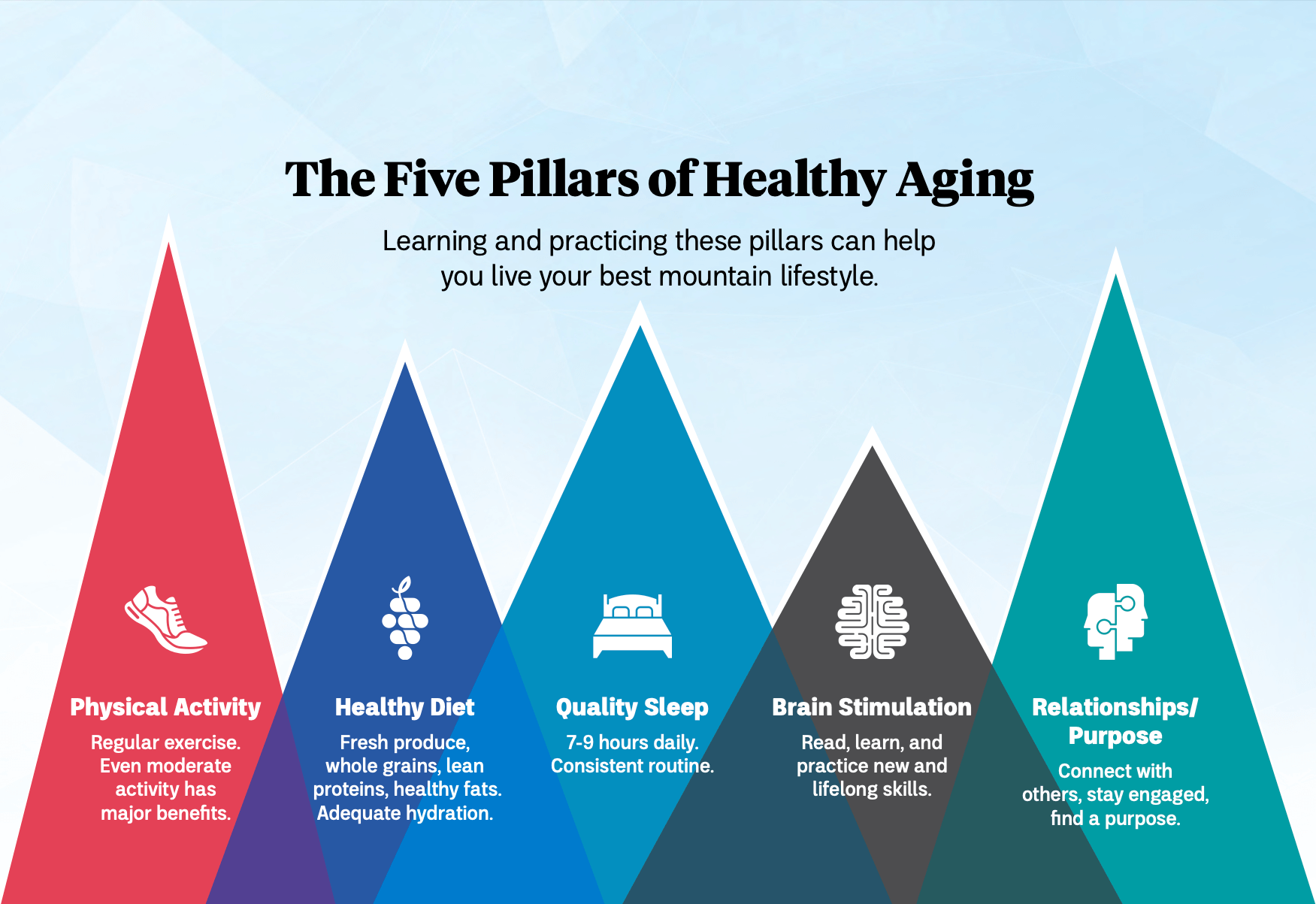Healthy Aging: Tips for Maintaining Vitality and Well-being as You Grow Older
Aging is a natural part of life, and while it brings its challenges, it also offers the opportunity for continued growth, learning, and wisdom. Maintaining health and vitality throughout the aging process is not only possible but also empowering. By adopting the right habits and mindsets, we can navigate this stage of life with strength, resilience, and dignity. Whether you're entering your senior years or supporting a loved one, understanding the key elements of healthy aging can help you stay physically, mentally, and emotionally well for years to come.
Image: Defying to grow old
The Foundations of Healthy Aging
Aging gracefully involves nurturing both your body and mind. As we age, our bodies go through changes that impact everything from energy levels to cognitive abilities, but by focusing on a few essential areas, we can thrive well into our later years.
1. Physical Health: Keep Moving, Stay Strong
Staying physically active is one of the most important things you can do for your health as you age. Regular exercise helps maintain muscle mass, joint flexibility, and balance, all of which reduce the risk of falls and injuries. Engaging in activities that suit your abilities—such as walking, swimming, or yoga—not only helps to preserve your strength and mobility but also promotes cardiovascular health.
- Strength training: Exercises that build muscle can help combat the natural decline in muscle mass that comes with age, supporting metabolism and physical function.
- Balance and flexibility: Practices like yoga or tai chi can improve flexibility and reduce the risk of falls, while also helping to alleviate joint stiffness.
- Cardiovascular health: Regular aerobic exercise, such as brisk walking, swimming, or cycling, helps to keep your heart and lungs in good shape.
In addition to exercise, nutrition plays a critical role in maintaining physical health. A well-balanced diet rich in fruits, vegetables, lean proteins, and healthy fats provides the necessary nutrients to fuel your body. Staying hydrated is also essential, especially as the sensation of thirst diminishes with age.
Tips for Physical Health:
- Incorporate 150 minutes of moderate exercise into your weekly routine.
- Prioritize strength training twice a week to build and maintain muscle.
- Drink plenty of water and focus on nutrient-dense foods to nourish your body.
2. Mental Well-being: Keep Your Mind Sharp
Just as physical health is essential, keeping your mind sharp is crucial to aging well. Cognitive decline is a natural part of aging, but engaging in regular mental challenges can help preserve your memory, attention, and problem-solving abilities. Research shows that lifelong learning and mental stimulation can even help reduce the risk of conditions like Alzheimer's and dementia.
- Mental exercises: Activities like puzzles, crosswords, reading, or learning new skills can keep your brain engaged and active.
- Hobbies: Developing new hobbies or continuing old ones, such as painting, gardening, or playing a musical instrument, can help stimulate cognitive function.
- Social interaction: Staying connected with family, friends, and your community is just as important for mental health as any brain exercise. Social engagement helps reduce feelings of loneliness and boosts mood and emotional well-being.
Tips for Mental Well-being:
- Try learning something new every week to challenge your brain.
- Stay socially active by joining clubs, attending events, or volunteering in your community.
- Take time each day to engage in activities that require problem-solving or creativity.
3. Managing Chronic Conditions: Prevention is Key
As we age, the risk of developing chronic conditions such as heart disease, diabetes, and arthritis increases. However, the good news is that many of these conditions can be managed—or even prevented—by maintaining a healthy lifestyle. Regular check-ups with healthcare providers are essential for monitoring your health and addressing any potential issues early.
- Heart health: Regular exercise and a heart-healthy diet can reduce the risk of cardiovascular diseases. Eating foods rich in omega-3 fatty acids, like fish and flaxseeds, and cutting back on processed foods and sugars can keep your heart strong.
- Diabetes management: Maintaining a healthy weight and staying physically active helps regulate blood sugar levels, reducing the risk of type 2 diabetes.
- Joint and bone health: Bone density naturally decreases with age, leading to conditions like osteoporosis. Weight-bearing exercises and a diet rich in calcium and vitamin D can help maintain bone strength.
Tips for Managing Chronic Conditions:
- Schedule regular screenings for blood pressure, cholesterol, and glucose levels.
- Work with your doctor to monitor and manage any existing conditions.
- Focus on a balanced diet and maintain a healthy weight to reduce strain on joints and organs.
4. Emotional Health: Stay Positive, Stay Connected
Emotional well-being is often overlooked, but it plays a significant role in healthy aging. Staying positive, fostering social connections, and managing stress are all key to maintaining emotional health.
- Optimism and purpose: Cultivating a positive outlook on life can improve not only emotional well-being but also physical health. Studies have shown that people who maintain a sense of purpose and stay optimistic tend to live longer, healthier lives.
- Social support: A strong support system can make all the difference. Whether it's spending time with loved ones, joining social groups, or participating in community activities, maintaining social connections helps ward off feelings of isolation and depression.
- Mindfulness and relaxation: Stress management techniques like meditation, mindfulness, or deep breathing can significantly impact your mental and emotional state. These practices help reduce anxiety, improve focus, and promote relaxation.
Tips for Emotional Health:
- Focus on activities that bring you joy and fulfillment.
- Stay connected with friends and family, even if it’s through virtual means.
- Practice gratitude and mindfulness to help manage stress and improve emotional resilience.
5. Preventive Healthcare: Be Proactive About Your Health
Preventive care is a cornerstone of healthy aging. Regular doctor visits and age-appropriate screenings can catch health issues early and prevent them from escalating. Some of the most important health screenings for seniors include:
- Blood pressure and cholesterol checks: Regular monitoring helps detect cardiovascular risks early.
- Bone density scans: These tests assess bone health and detect osteoporosis, a condition that weakens bones and increases the risk of fractures.
- Vision and hearing tests: As we age, our senses can deteriorate. Regular exams help detect and correct any issues, such as cataracts or hearing loss.
- Cognitive evaluations: These screenings assess memory and cognitive function, which can help catch conditions like dementia early.
In addition to these standard tests, healthcare providers may recommend specialized assessments depending on individual health concerns, such as cancer screenings or cardiac stress tests.
Tips for Preventive Healthcare:
- Schedule annual check-ups and don’t skip recommended screenings.
- Stay informed about any medications or treatments you’re prescribed.
- Discuss any concerns with your doctor and be proactive about your health.
Strategies for Aging Well
Incorporating healthy habits into your daily routine can have a profound impact on how you age. Here are a few strategies that can help you stay vital and strong throughout your golden years:
- Exercise regularly: Aim for at least 30 minutes of physical activity each day, including strength training, flexibility, and balance exercises.
- Eat well: Focus on whole foods that provide essential vitamins and minerals. Ensure your diet includes fruits, vegetables, lean proteins, and healthy fats.
- Stay mentally engaged: Challenge your brain with activities that require focus and creativity, like puzzles, reading, or learning something new.
- Prioritize rest: Ensure you get 7-9 hours of sleep each night. Rest is essential for physical recovery and mental clarity.
- Maintain social connections: Stay involved in social activities that bring joy and fulfillment. Strong relationships are a key part of emotional well-being.
Embracing the Aging Process
Aging gracefully is about more than just managing health—it's about embracing the journey. Each stage of life brings its own unique experiences and challenges. By accepting these changes and approaching them with positivity, you can make the most of your later years.
Rather than focusing on the limitations that aging may bring, celebrate the opportunities it provides for personal growth, reflection, and connection with others. Surround yourself with people and activities that lift your spirits, and take the time to care for your body and mind.
Conclusion
Aging well is a continuous journey that requires attention, effort, and care. By adopting healthy habits, staying active, nourishing your mind and body, and fostering meaningful relationships, you can maintain vitality and joy well into your later years. Approach aging with gratitude and openness, and embrace the wisdom and experience that come with this natural stage of life. With the right mindset and strategies, aging gracefully is not only achievable but also deeply fulfilling.
Stay empowered, stay connected, and remember—growing older is a gift, and with it comes the opportunity to live fully and healthily every single day.



Comments
Post a Comment